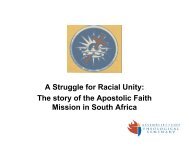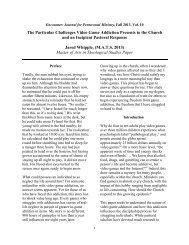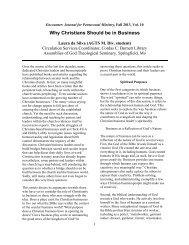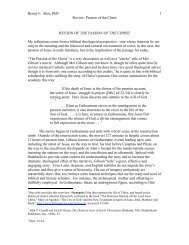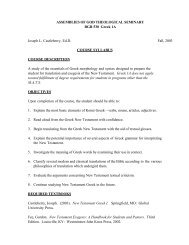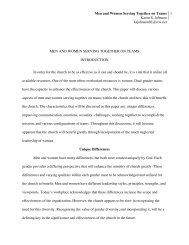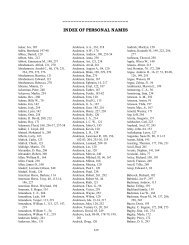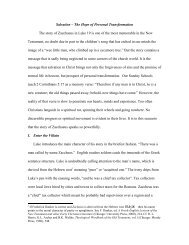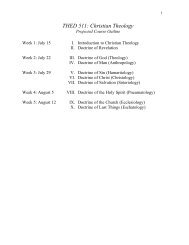Encounter: Journal for Pentecostal Ministry - Assemblies of God ...
Encounter: Journal for Pentecostal Ministry - Assemblies of God ...
Encounter: Journal for Pentecostal Ministry - Assemblies of God ...
Create successful ePaper yourself
Turn your PDF publications into a flip-book with our unique Google optimized e-Paper software.
the patriarchal narratives <strong>of</strong><br />
Genesis, which describe,<br />
<strong>of</strong>ten in great detail, the<br />
considerable wealth <strong>of</strong><br />
Abraham, Isaac, Jacob, or<br />
Joseph in Egypt (Gen. 13:2;<br />
26:13; 30:43; 41:40). With<br />
their large flocks and families<br />
and numerous servants and<br />
slaves, the patriarchs bear the<br />
covenant promise <strong>of</strong> <strong>God</strong><br />
without any hint <strong>of</strong> <strong>God</strong>‟s<br />
displeasure over their wealth.<br />
Along with this, goes an<br />
emphasis upon their<br />
generosity and hospitality to<br />
friends and foes alike. 36<br />
Many Christians falsely perceive the biblical<br />
text as stating that wealth and money are<br />
evil and that having possessions is wrong.<br />
However, one must not misunderstand the<br />
message <strong>of</strong> Luke or any other biblical writer.<br />
These biblical examples <strong>of</strong> righteous and<br />
devout followers <strong>of</strong> <strong>God</strong> who lived in the<br />
abundance <strong>of</strong> wealth reveal that one can<br />
enjoy the blessings <strong>of</strong> <strong>God</strong> if done in a<br />
correct manner. In support <strong>of</strong> this concept,<br />
Deuteronomy 15:4-5 states: “However, there<br />
should be no poor among you, <strong>for</strong> in the<br />
land the LORD your <strong>God</strong> is giving you to<br />
possess as your inheritance, he will richly<br />
bless you, if only you fully obey the LORD<br />
your <strong>God</strong> and are careful to follow all these<br />
commands I am giving you today.” This<br />
Judaic understanding is important <strong>for</strong> the<br />
modern-day comprehension <strong>of</strong> how the<br />
Jewish people perceived wealth. According<br />
to Davids, during the time <strong>of</strong> Christ many<br />
people lived in extreme poverty, and<br />
confusion had taken over the Judaic<br />
understanding <strong>of</strong> how to deal with the large<br />
gap between the religious elite and the<br />
“people <strong>of</strong> the land” living in poverty.<br />
Jesus needed to rein<strong>for</strong>ce the correct Judaic<br />
understanding <strong>of</strong> how the wealthy should<br />
6<br />
handle themselves financially and the way in<br />
which the poor should view their own<br />
economic and religious state. While the<br />
Pharisees and wealthy classes <strong>of</strong>ten viewed<br />
the poor as religiously and spiritually poor,<br />
Jesus‟ sayings contrast the poor with the<br />
rich, instead <strong>of</strong> the greedy or wicked as in<br />
the Old Testament. 37 This perception reveals<br />
that economic issues were <strong>of</strong> great<br />
importance in His day. 38<br />
Luke‟s Gospel heavily focuses on the<br />
presence and condition <strong>of</strong> the poor, the way<br />
in which <strong>God</strong> viewed those living in<br />
poverty, Jesus‟ attitudes, actions, and<br />
teachings involving the poor, and His<br />
warnings regarding their abuse and neglect.<br />
Mel Shoemaker concludes that Luke‟s<br />
Gospel is primarily addressed to those who<br />
are actually far from poverty and<br />
categorized as wise, influential, and <strong>of</strong> noble<br />
birth, all <strong>of</strong> which are considered wealthy in<br />
most cases. 39 Perhaps Luke‟s intent is to<br />
proclaim to those <strong>of</strong> wealthy status the need<br />
to care <strong>for</strong> those who did not share their<br />
financial state. Throughout his article, the<br />
primary passages Davids refers to in Luke‟s<br />
Gospel that convey the idea <strong>of</strong> the “rich and<br />
poor,” whether mentioned or implied, are:<br />
4:18-21, 6:20 and 24, 12:16-21 and 33-34,<br />
14:14 and 21, 16:9 and 19-31, and 16:19-3. 40<br />
Bock also provides a list <strong>of</strong> texts in which<br />
the poor or rejected are mentioned,<br />
including Luke 1:46-55 and 21:1-4. 41<br />
Wealth and Poverty in Luke’s Gospel<br />
<strong>God</strong>‟s Perception <strong>of</strong> the Poor<br />
At the beginning <strong>of</strong> Luke‟s Gospel, Mary<br />
rejoices in <strong>God</strong> through song after receiving<br />
the announcement <strong>of</strong> her pregnancy with the<br />
Son <strong>of</strong> <strong>God</strong>. Record <strong>of</strong> her song, the<br />
Magnificat, is found in 1:46-55, and she<br />
specifically emphasizes the status <strong>of</strong> the<br />
humble and lowly. Mary praises <strong>God</strong> <strong>for</strong><br />
choosing to use her as an instrument <strong>of</strong>



